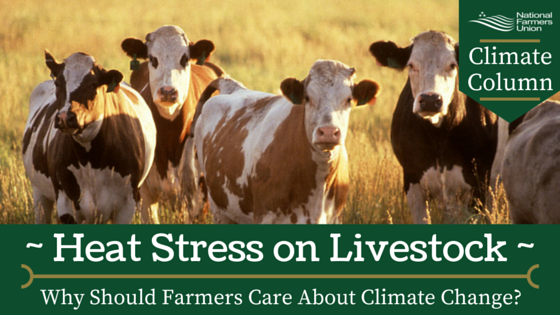 By Tom Somrack, NFU Government Relations Intern
By Tom Somrack, NFU Government Relations Intern
As the previous Climate Column noted, rising temperatures resulting from climate change can have serious repercussions for both crop growers and livestock producers. According to the National Climate Assessment: Climate Change Impacts in the United States, “Summer temperatures are projected to continue rising, and a reduction of soil moisture, which exacerbates heat waves, is projected for much of the western and central U.S. in summer.” USDA’s series of Regional Vulnerability Assessments gives each region of the United States a “snapshot” of current climate vulnerabilities and goes in depth on how increases in extreme heat can cause stress on agricultural lands and livestock. The assessments also list extreme heat as a major issue, reducing crop production yields, increasing heat stress on livestock and reducing livestock production.
According to this USDA Economic Research Service article, “On average, U.S. dairies will experience an annual temperature increase between 1.45 and 2.37 degrees Fahrenheit by 2030.” Rising average temperatures and more frequent heat waves, without being combatted, means an increase in heat stress for dairy cows, and consequently a decrease in milk production. “In 2010, heat stress lowered the value of annual milk production for the average dairy farm by about $39,000, which equates to $1.2 billion in lost production for the entire dairy sector.” Heat stress also decreases reproduction rates and increases water intake for the cows.
The same is true for other livestock animals, while heat stress also reduces feed intake, which leads to reduced weight gain, increases disease susceptibility, and causes changes in an animal’s behavior.
Are you a farmer who has experienced the hardships of a changing climate? Are you concerned or have you experienced livestock heat stress? Please share your thoughts in the comments below and with the NFU Climate Leaders Facebook group!
Like what you’ve read? Check out our Climate Leaders home page, join the conversation in the NFU Climate Leaders Facebook Group, and keep up-to-date with NFU climate action by signing up for the mailing list.

